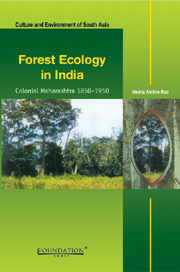Book contents
- Frontmatter
- Contents
- Preface
- Glossary
- Maps
- 1 Introduction
- 2 Pre-Colonial Maharashtra
- 3 Early British Management of Forests
- 4 Evolution of Forest Policy and Forest Acts of 1865 and 1878
- 5 Implementation of 1878 Act
- 6 Forest Policy During 1900–1950
- 7 People's Resistance
- 8 Conclusion
- Appendix - I
- Appendix - II
- Bibliography
- Index
2 - Pre-Colonial Maharashtra
Published online by Cambridge University Press: 26 October 2011
- Frontmatter
- Contents
- Preface
- Glossary
- Maps
- 1 Introduction
- 2 Pre-Colonial Maharashtra
- 3 Early British Management of Forests
- 4 Evolution of Forest Policy and Forest Acts of 1865 and 1878
- 5 Implementation of 1878 Act
- 6 Forest Policy During 1900–1950
- 7 People's Resistance
- 8 Conclusion
- Appendix - I
- Appendix - II
- Bibliography
- Index
Summary
Recent concern for sustainable development has made it necessary for us to examine the consequences of our actions upon the environment. The overuse of natural resources has become a major international concern. The focus of this unit is the land distribution and forest management practices of the Maharashtra that were under Maratha control, namely the Maval region (part of Western Ghats), the high and arid plains of the Desh region, and the Konkan costal area. Marathas, beginning with the Bhosle dynasty, and later, the Peshwas, ruled this region from 1640 to 1818.
This type of study must consider the geographical diversity, and various political, socio-economic, cultural and religious influences present in modern-day India. In order to understand a society's relationship with nature, one must first analyse the socio-political and economic conditions that existed within its borders.
As we reconstruct the environmental history of this region, it is important to note that the area is comprised of three distinct geographical zones: the high, arid plains; the mountainous region and the wet, coastal areas. Hence, each area differs in terms of its available resources, farming practices, political history, and its interactions with outsiders. However, one can also see significant similarities between the populations of each geographical area, i.e. they share comparable socio-economic systems and common religious practices. These variables will serve as recurring themes in the pre-colonial history of this region.
Village Structure and Distribution of Land
The village was a self-supporting unit, whose patterns of agriculture were largely determined by its specific requirements. Since most agricultural production catered to the local needs, the activities of a given area were directed towards fulfilling the individual needs.
- Type
- Chapter
- Information
- Forest Ecology in IndiaColonial Maharashtra, 1850-1950, pp. 20 - 39Publisher: Foundation BooksPrint publication year: 2007



